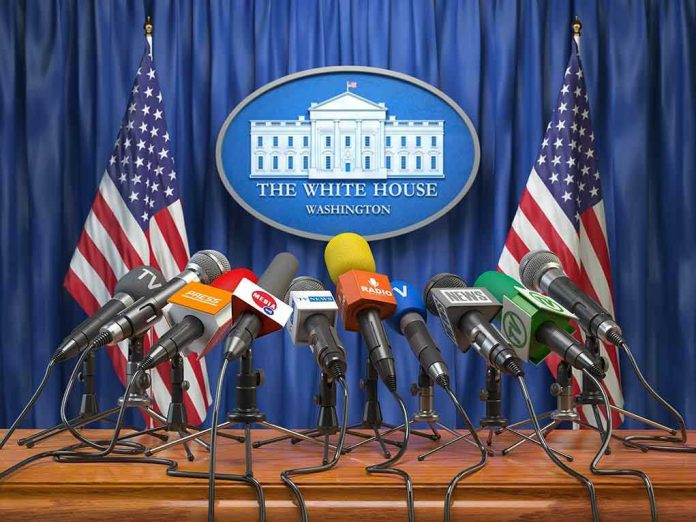
Former White House press secretary Karine Jean-Pierre is accusing Democratic leaders of ignoring voters by refusing to fully back progressive socialist Zohran Mamdani in the New York City mayoral race, igniting a firestorm within the party.
Story Highlights
- Karine Jean-Pierre publicly criticized Democratic leaders for withholding endorsement of Zohran Mamdani.
- House Minority Leader Hakeem Jeffries gave a qualified endorsement, while Senate Minority Leader Chuck Schumer refused to back Mamdani.
- Progressive lawmakers, including Rep. Ilhan Omar, have joined Jean-Pierre in condemning the party’s hesitation.
- The controversy highlights deepening divisions between the Democratic establishment and its progressive wing.
- The endorsement debate could shape the party’s future direction and voter mobilization strategies.
Progressive Outcry Over Endorsement Snub
Former White House press secretary Karine Jean-Pierre has launched a scathing critique of Democratic leadership, accusing them of ignoring the will of progressive voters by refusing to endorse Zohran Mamdani, a democratic socialist running for New York City mayor. Jean-Pierre’s comments, made in a recent interview with The New Yorker, underscore growing frustration among grassroots activists who feel party leaders are out of touch with the base. Her remarks come amid a broader debate over the Democratic Party’s identity and its willingness to embrace candidates who challenge the status quo.
Progressive lawmakers, including Rep. Ilhan Omar, have echoed Jean-Pierre’s criticism, arguing that the party’s refusal to fully support Mamdani undermines its commitment to unity and grassroots engagement. Omar specifically called out Senate Minority Leader Chuck Schumer for withholding endorsement, stating that Democrats should support their party’s nominees and not create divisions that could weaken their electoral prospects. The debate has intensified as Mamdani remains the frontrunner in the race, facing off against Andrew Cuomo and Curtis Sliwa.
Establishment Hesitation and Party Division
House Minority Leader Hakeem Jeffries issued a nuanced endorsement of Mamdani, praising his focus on addressing the affordability crisis but noting “areas of principled disagreement.” This cautious approach reflects the establishment’s concern about Mamdani’s progressive agenda, which includes policies that some party leaders view as too radical. The hesitation to fully back Mamdani has sparked accusations of elitism and a disconnect between party leadership and its base. Experts suggest that the endorsement debate could have lasting implications for the Democratic Party’s strategy and its ability to mobilize voters in future elections.
The controversy is not new; similar tensions have emerged in the past, such as during Alexandria Ocasio-Cortez’s rise to prominence. The current situation highlights the ongoing struggle between the party’s centrist establishment and its progressive wing. As the New York City mayoral race unfolds, the outcome of the endorsement debate could shape the party’s direction and influence its national image. Political scientists note that endorsements play a crucial role in signaling party priorities and mobilizing voters, making this a pivotal moment for the Democratic Party.
Broader Implications for the Democratic Party
The endorsement debate over Mamdani is more than just a local issue; it reflects deeper ideological divides within the Democratic Party. The controversy could impact voter turnout and party unity in the upcoming mayoral race, with potential long-term consequences for candidate selection and policy priorities. Progressive voters and activists are watching closely, as the party’s response to Mamdani’s candidacy may signal its willingness to embrace change or maintain the status quo. The outcome of this debate could shape the Democratic Party’s future and its ability to respond to the evolving needs of its base.
Karine Jean-Pierre accuses Democratic leaders of ignoring voters by not endorsing Mamdani https://t.co/9R14CUb6vu pic.twitter.com/T3TG8q2FPK
— New York Post (@nypost) November 7, 2025
The endorsement controversy has also drawn attention from national media and political analysts, who see it as a litmus test for the party’s unity and responsiveness to grassroots movements. As the Democratic Party navigates these internal tensions, the decisions made in the coming weeks could have far-reaching implications for its electoral prospects and policy agenda. The debate over Mamdani’s candidacy is a clear example of the ongoing struggle between the party’s establishment and its progressive wing, a struggle that will likely continue to shape the party’s future.
Sources:
The New Yorker: Writer tangles with Jean-Pierre over Mamdani endorsement
National Review: Mamdani is not a mandate














